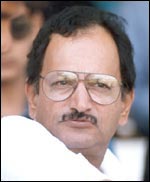Many of Ajit Wadekar's victories as captain were choreographed by India's famous spin quartet -- E A S Prasanna, Bishen Singh Bedi, Srinivas Venkataraghavan and, above all, Bhagwat Subramaniam Chandrashekar.
The former skipper explains what Chandra's talent meant to him.

If I was a winning captain it was because I had the best spinners in the world.
All the four (Bedi, Prasanna, Venkataraghavan and Chandrasekhar) were very good and handled the pressure of not having a frontline fast bowler very well.
Chandrashekhar was a match-winner. That's the reason I used to take care of him.
His biggest strength was that he could make the ball spin on any track, whether it was dead or one that turned a lot.
What I used to notice about him was that if he couldn't get wickets in the first two overs then, unconsciously, he would start experimenting.
As a result, he would bowl full tosses, go off the track, basically, and then would get hit. After two overs I would change him and then bring him back. That's when he used to get wickets.
Since we didn't have too many runs to play with I had to make judicious use of him. But once he started picking wickets nobody could stop him.
Chandra was not a genuine leg-spinner, but a freak bowler. If he started bowling on the spot then any batsman in the world would find it difficult to read him. He bowled googlies and the faster ones; his faster ones were sometimes even faster than those of (India medium pace bowler) Ramakant Desai.
When he would have that special grip for the faster one I would go two steps behind in the slips. He always needed great fielders -- the cordon of slip fielders.
Luckily, I had those fielders like Sunil Gavaskar, Venkataraghavan and Abid Ali. He was encouraged by that.
India won the match at the Oval (versus England in 1971) mainly because of him.
The match turned out to be of only four days, the second day being washed out.
We were trailing by 71 in the first innings. English journalists were contemplating on what score (English skipper Ray) Illingworth would declare at.
But they didn't realise that Chandra would bowl again in the second innings.
None of the English batsmen could read him and the team folded for 101. That was the best I saw him bowl.
England had a very good batting line-up but didn't know what was happening. We had to get only 170-odd runs. That victory was solely because of Chandra.
Unfortunately, he couldn't come to the West Indies (earlier in 1971). He would have made a very big impact there.
Chandra got a lot of wickets on foreign soil because he was not a regular leg-spinner. You don't come across bowlers like him every now and then. By the time the batsmen came to terms with his bowling the tour would be over and he would return with lot of wickets.
He preferred to bowl with Prasanna or Venkataraghavan because he would like one end to be shut so that he could experiment. The batsmen would try to attack him and lose their wickets.
Those days our batting wasn't very strong. We had to use Chandra sparingly because if he got to experiment he tended to tend to give away runs.
I would basically rotate my spinners, but the problem was we used to bowl more overs since we had three or, sometimes, four spinners in the squad. That meant we were giving the opposition more number of balls to play.
Celebrating Chandra: Complete coverage
Generally captains give their main bowler a longer spell, but I had to work it out according to the situation and Chandra's temperament.
He was a very quiet chap and a complete captain's bowler. He left tactics and strategies and field setting entirely to me. It was very difficult to force him to bowl on a specified line and length. All he would do was bowl on the right spot and then leave the rest to the ball.
He was also a perfect team man and never uttered a word against anyone. He cut jokes sometimes in the dressing room and had a very infectious laugh. He loved to sing and was crazy about the singer Mukesh and even attended his funeral.
His batting wasn't a liability, but he was not a batsman at all. It was like playing with ten batsmen only. There were a lot of holes in his bat, but it did not matter as he was such a great bowler. And you don't expect bowlers to get runs.
He wasn't a brilliant fielder either. But what was there to complain about? Chandra's bowling was a class act.
Ajit Wadekar spoke with Deepti Patwardhan






